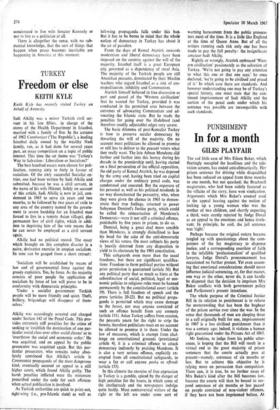In for a month
PUNISHMENT GILES PLAYFAIR
The sad little case of Mrs Eileen Baker, which fleetingly occupied the headlines and the tele- vision screens, has ended anti-climactically. Her prison sentence for driving while disqualified has been reduced on appeal from three months to one month, but not quashed; the Bracknell magistrates, who had been widely featured as the villains of the story, have won vindication. Arguments which Mrs Baker's counsel used at the appeal hearing against the notion of locking up a young woman who was the mother of two children, and shortly expecting a third, were sternly rejected by Judge Duval as an appeal to the emotions and hence irrele- vant. In principle, he said, the jail sentence was 'right.'
Perhaps because the original outcry became tangled up with questionings about the com- petence of the lay magistracy to dispense justice, and a corresponding assertion of faith in the infallible 'professionalism' of qualified lawyers, Judge Duval's pronouncement has occasioned no further protest. Yet even assum- ing that emotional considerations should never influence judicial sentencing, or, for that matter, one way or the other, never do, it can hardly be disputed that the decision to imprison Mrs Baker conflicts with both government policy and Parliament's present intentions.
The whole purpose of the Criminal Justice Bill in its relation to punishment is to relieve the overcrowding that has been the bugbear of the prison service ever since the war. In the sense that thousands of men are sleeping three to a cell originally built for one, imprisonment in 1967 is a less civilised punishment than it was a century ago; indeed, it violates a human right guaranteed under the Prisons Act of 1865.
Mr Jenkins, to judge from his public utter- ances, is hoping that the Bill will result in a virtual end to the great majority of prison sentences that the courts actually pass at present—namely, sentences of six months or less. But to achieve this objective he is relying more on persuasion than compulsion. There can, it is true, be no further cases of Mrs Baker's kind after the Bill becomes law, because the courts will then be bound to sus- pend sentences of six months or less passed on people convicted of non-violent offences, if they have not been imprisoned before. At
the same time, the Bill seems unlikely to have better than a minimal effect on the problem of overcrowding, unless the courts are pre- pared to observe its spirit as well as its letter. The question remains whether their coopera- tion can be won—and, just as importantly, whether it is deserved.
Theoretically, society would have no rational cause for alarm, if the short prison sentence were simply to be abolished. It has long been regarded by penologists as an essentially use- less and undesirable form of dunishment. For example, a report to a United Nations Con- gress in 1960, from a European working group upon which Britain was represented, pointed out that while it threatened loss of employment, family disruption and 'moral contamination,' it didn't provide any opportunity for 'a sufficiently lengthy treatment.'
In practice, however, the courts cannot be fairly accused of sticking to the short prison sentence out of mere ignorance or folly. There are times, no doubt, when they misuse it, but just as often they feel compelled to resort to it faute de mieux. Though they may have little or no faith in its likely effectiveness, and may even be fully alive to its potential harmfulness, they dare not accept the social risk of taking any other course. (Nor at present is it always pos- sible: there are for example no probation hostels available for persistent adult petty offenders.) This is bound to remain their dilemma, short of a determined effort on the Govern- ment's part to strengthen and develop alterna- tive treatment methods to imprisonment. But there is no sign of any such thing happening at the moment. The probation service is grossly overloaded and undernourished. Though the Criminal Justice Bill promises that imprisonment for drunkenness will be abolished as soon as 'the Secretary of State is satisfied that sufficient suitable accommodation is avail- able for the care and treatment of people convicted of this offence,' plans for offering the Secretary of State such satisfaction have yet to be announced. Again, it is surely deplor- able that though, as quite frequently happens, a court may wish to make a hospital order under the Mental Health Act, it is obliged to pass a prison sentence instead, because no appropriate space in a hospital can be found.
In short, if Mr Jenkins is to win the co- operation of the courts, it is certainly no less important for him to invest in the development of reliable means for keeping people out of prison than in the far costlier business of keeping them safely immured when they get there. Whatever may be said in favour of the vast new prison building programme that was launched in 1956, the bleak fact is that after meeting a bill of some £34 million we are no nearer solving the problem of overcrowding than we were at the outset. Nor, in Lord Mountbatten's view at least, do we possess a single closed institution that comes up to modern standards of either security or hygiene.
In these circumstances, Mr Jenkins might be wise, the security scare notwithstanding, to take a little time out for reflection before plunging ahead with the expenditure of further millions in pursuit of a perhaps illusory end. At least, he should realise that if money is needed to build new prisons, more than ex- pressions of hope are required to empty the old ones.































 Previous page
Previous page